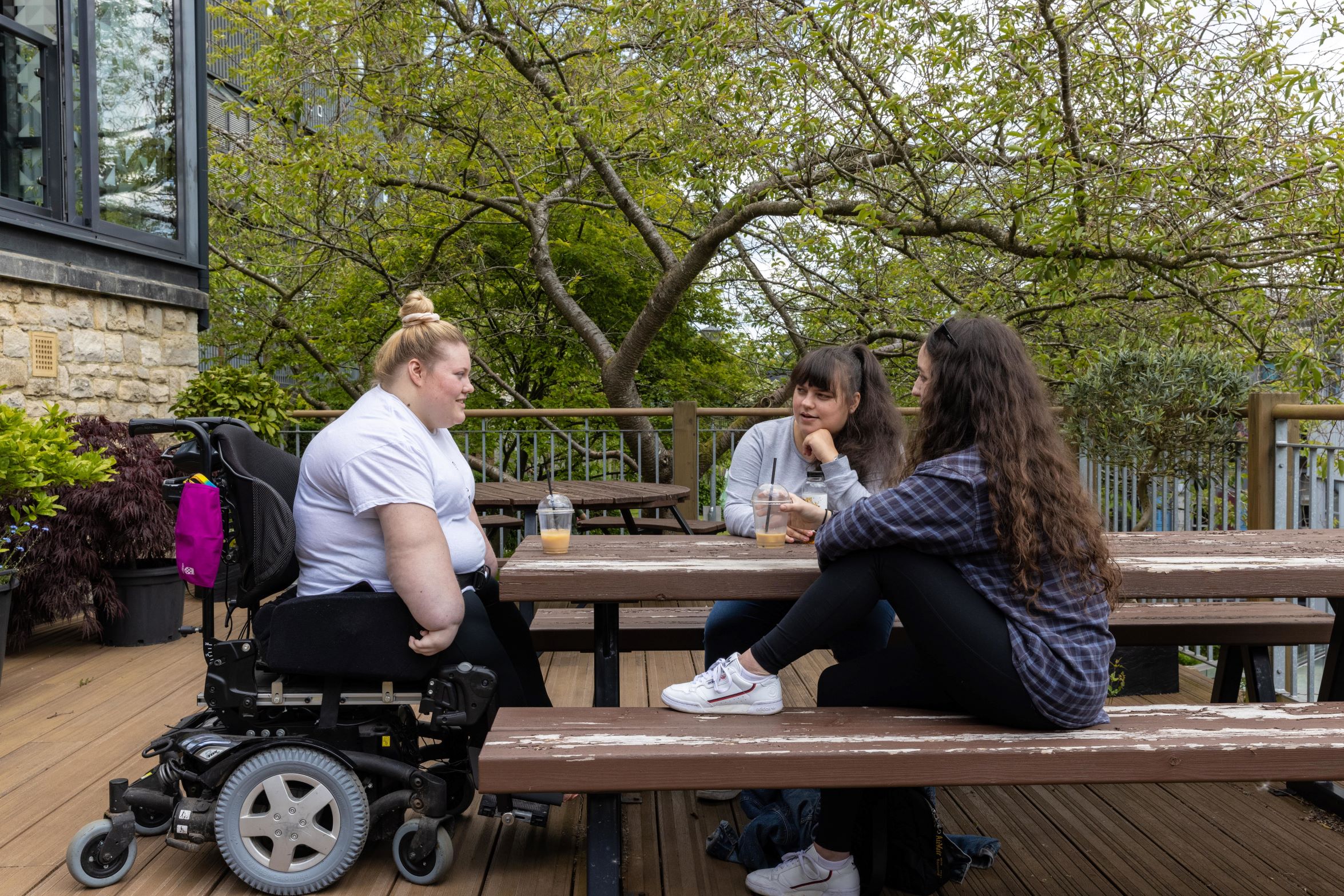Graduate support: life after university
As a graduate of the University of Winchester we are delighted to continue to support you through our Careers Advice for Life offer. You can take advantage of a range of resources or arrange in-depth discussions with advisers, focusing on any aspect of your future career.

Access CareerConnect - our online career management platform
Don't forget that CareerConnect - our online careers platform - is still available to you. Either use the account you had previously via the student link above, or set up a new one here. If you have registered with a University email address you will need to update this to a personal email address - find out how to do this here.
CareerConnect can:
- Send you email alerts - set your alert preferences on CareerConnect to graduate jobs/internships to suit your requirements
- Help you to book a Careers Guidance Appointment
- Give you access to our online resources, such as our bitesize films on CVs, applications, interviews and personal statements
- Allow you to receive our CareerConnect newsletter and find out about events to support your career development.
Careers Guidance Appointments
You are welcome to book a 40-minute Careers Guidance Appointment with one of our Careers Consultants. You can choose an online or in-person slot - log in to your CareerConnect account and go to the 'Appointments' tab in the top-right corner of the screen to get started. The appointment offers you an in-depth discussion focused on any aspect of your future career.
Tips for finding graduate employment:
- Enrol to get notifications on specialist graduate job sites such as Prospects or Targetjobs, or more generalised sites like Reed and Indeed
- Search on the websites of companies you would like to work for. Most have a Careers or a Jobs section, which is often located at the top or bottom of their webpage
- Use sector specific job sites for particular industries
- Update your profile on LinkedIn and connect with previous graduates, lecturers and those working in companies you are interested in reaching out to.
- Uncover the hidden job market by sending speculative applications. Be proactive and send employers a well-written CV with a covering email, explaining why you are interested in them and what skills you bring.
Careers guidance appointments
You are welcome to book a 40-minute Careers Guidance Appointment with one of our Careers Consultants. You can choose an online or in-person slot - log in to your CareerConnect account and go to the 'Appointments' tab in the top-right corner of the screen to get started. The appointment offers you an in-depth discussion focused on any aspect of your future career.
Consider postgraduate and further study

The Careers and Opportunities Team can support you in exploring options for further study, choosing a course, and writing a personal statement. Read our Postgraduate and Further Study guide and book an appointment with a Careers Consultant for more help and information.
Our academic departments, centres and institutes offer a range of study options within the arts and humanities, social sciences, cultural studies, computing, and entrepreneurial business and management. Further details on advertised courses at the University of Winchester can be found here.
Business startup support

You can access email support and digital resources via the ‘UoW Resources’ page on CareerConnect, where you can click on ‘Entrepreneurship and Freelancing’. If you would like more in-depth support, you can email startup@winchester.ac.uk.
How to understand the world of work

Heading out into the world of work after your studies is likely to mean that you will encounter many unfamiliar terms and concepts.
There are, for example, different kinds of work contracts that are available.
These come with many responsibilities for employers – the Government and ACAS websites may be good places to start if you want to learn more.
Depending on your circumstances, you may not have the same rights as workers. If you’re self-employed, traditional employment law might not cover you, but you will have protection for health and safety and (in some cases) against discrimination. Your rights and responsibilities will generally be set out in any contract with a client.
As a freelancer, consultant or contractor, you will either be working for yourself or employed by another company, but you’ll still be responsible for your own income tax and National Insurance Contributions (NICs). There is a lot you need to know about both of these.
Firstly, how they are paid depends on whether you’re employed or self-employed. If employed, they’ll probably be deducted from your wages first. If you’re self-employed, however, you’ll need to pay through self-assessment. There are plenty of videos and webinars online to guide you through this, and you can also contact HMRC or visit the Government website for more information. If you wish, you can even be assisted by an accountant.
Tax documents you will need to be familiar with include the P60 (which shows the tax you’ve paid in the tax year, from 6 April to 5 April), and the P45. This shows how much tax you’ve paid up to the point of your departure, and has four parts:
- Part 1 is sent by your employer to HMRC (you are then sent the other parts)
- You give Parts 2 and 3 either to your new employer, or to Jobcentre Plus if you’re not working
- You keep Part 1A for your own records.
Information on your state pension, how much you’ll get and when you can claim it is available here. You can also find out about workplace pensions – your contributions to this will give you additional income alongside your state pension when you retire.
Managing your money

Budgeting is always useful in helping you save – you could use a budgeting tool to help you with this. Many straightforward examples can be found online, and apps are also available.
If you’re looking for work, you might like to read the Government’s guidelines for the National Minimum Wage.
If you drive and have a car, you should tell your insurer that you are no longer a student, plus any other relevant changes. If you travel by train frequently, you may be eligible for a railcard, and some employers offer interest-free loans for annual travel cards too. They may also help you to purchase a bicycle, if you’re a keen cyclist.
If you have a student bank account, this is likely to mature into a graduate account automatically at the end of your course. In some cases, though, it will have to meet certain criteria to do so. If unsuccessful, it will be converted to a standard current account – in which case you should contact your bank to establish what to do next.
If you do need to open a new graduate account, you should consider the following:
- Don’t necessarily stay with the bank responsible for your student account – consider other options
- Get the best 0% overdraft possible.
- Graduate accounts aren’t just for new graduates, so consider one if you’re a less recent graduate as well.
- Never exceed your overdraft limit – track your money carefully if you think you’re getting close to it.
- If you’re likely to be in credit, choose a bank that offers you good interest rates.
Employee Help Card
If you’re heading into work, make sure your payslips are accurate with an Employee Help Card. It will help you give your employer all of the personal details they need to pay you properly – in this case, that means your name, date of birth and National Insurance Number. The card takes you through each of these individually, describing how they should be formatted (and, in the case of your National Insurance Number, where you can find it).
Repaying your student loan
The repayment plan of your Student Loan will be different depending on the year you began studying. Students who started studies between 2016 and 2022 (inclusive) will be on Payment Plan 2, and students starting study from September 2023 will be on payment Plan 5. Students who receive funding from Student Finance Wales, Student Finance Northern Ireland, or Student Awards Agency Scotland (SAAS) will have different repayment terms. Please see the relevant website for full details.
If you’re a full-time student, your repayments won’t start until the April after you graduate. If you study part-time, they will begin the April four years on from the start of the course. Once they have begun, they will continue until you either stop working or your income drops below £27,295 per year (as of January 2022). This amount can change - after 30 years, any outstanding debt is written off.
If you’re employed, your repayments will be deducted from your wages by your employer. If you’re self-employed, HMRC will work out what you pay using your tax return. You pay your tax and your loan repayment at the same time. These rules also stand if you work abroad for a UK employer, but if you work for an overseas employer, your repayments depend on the minimum amounts under Plan 1 or Plan 2 for the relevant country.
If you go abroad for more than three months, you must complete an overseas income assessment form to:
- Estimate your income for the following.
- Provide your bank details, as these will allow you to pay by Direct Debit. The Student Loans Company will work out whether you have to repay and how much.
- You’ll have to complete a new form every year you’re abroad.
The Interest added depends on what you earn. Student loan interest rates are based on the RPI of inflation (the rate at which prices rise). Whilst studying, until the April following graduation, you’re charged RPI + 3%. After that it depends on your annual earnings.
This table relates to Plan 2:
|
Your annual income |
Interest rate |
|
£27,295 or less |
RPI (currently 1.5%) |
|
£27,296 to £49,130 |
RPI (currently 1.5%), plus up to 3% |
|
Over £49,130 |
RPI (currently 1.5%), plus 3% |
If your course is starting from September 2023 onwards, and you are therefore on Plan 5 for payment, you might find these online resources useful:
- Click here for information relating to Plan 5 can be found on Page 19 of this booklet
- Click here for information on repaying loans can be found on the University’s Intranet pages (although this link will only be accessible to those with a University IT account).
The interest rate changes every September. You will be charged interest from the day your first payment is made until your loan is repaid in full. Interest is added to the total amount you owe, every month. This is based on the RPI rate of inflation in the year up to the previous March. The interest rate doesn’t change what you repay each year. The interest is paid off with your standard payments or if you choose to overpay your student loan to clear it quicker.
You should only overpay if you are a very high earner, likely to clear the loan and interest completely in under 30 years, or if you are paying a very large lump sum straight away.
Gap year

You might take the time after your degree to travel or work elsewhere in the UK or abroad (or just to enjoy yourself). If you are planning this, make sure that you use the time as effectively as possible, as any future employers will look favourably upon this when you come to apply for roles.
Think about the skills you might acquire and how you might develop during your time away. You’ll then be able to clearly articulate these in the future should you need to. You might also like to consider undertaking temp or voluntary work, or teaching English as a foreign language (also known as TEFL).
Whatever plans you make, research them carefully in advance, and plan your time to ensure you make the most of it. Take any visa requirements or work restrictions into account.
More information can be found on Prospects, which offers sections on TEFL and working abroad. The Workaway website may also be beneficial for those looking for hosts as they work across the world.
Your digital profile

Establishing a professional digital profile across all your social media accounts can really improve your career prospects and how employers view you. Having an active and well-maintained LinkedIn presence can be particularly useful as it can allow you to make connections with companies, their staff, and other potential collaborators.
You should ensure that this (and any other social media profile that may be relevant) provides a record of your achievements that is as comprehensive as possible, and displays a full range of abilities. Some may be from the workplace, but others may be academic or extra-curricular. Whatever they may be, the goal is to paint a clear picture and cement yourself as an approachable and professional individual. This should also be reflected in your profile picture, which should be appropriate for employers to see.
Academic references

There are two approaches to acquiring academic references when applying for a role.
If you require a full academic reference, which includes a comment on your character and abilities, you should contact one of your lecturers or your Programme Leader and make the request.
If you only require a reference which is evidence of a qualification or study period, for example, you should direct your prospective employer to contact Registry via registry.enquiries@winchester.ac.uk.
The Graduate Outcomes Survey

Fifteen months on from completing your studies you will be asked to participate in the Graduate Outcomes Survey. Whether you are in full-time employment, further study, running your own business or freelancing, the survey aims to capture what you are currently doing. You will be contacted by email and invited to complete it.
- What to expect
In this video, you can find further information on what any Winchester graduate about to complete the survey can expect.
- Who runs the Graduate Outcomes Survey?
The Graduate Outcomes Survey is owned by HESA, the Higher Education Statistics Agency. HESA supports the advancement of the higher education sector by collecting and publishing timely and reliable data about it. The administration of the Graduate Outcomes Survey is undertaken by a third-party contractor who works in collaboration with HESA.
- How will HESA know how to contact me?
The University of Winchester has a statutory responsibility to share with HESA the most up-to-date contact details that we hold for you. If you are unsure as to whether you have provided these, we recommend that you update your details here. Without them, you won’t be able to participate in the survey and you may also be missing out on exclusive benefits and opportunities that are available to you as alumni. Even if you are in touch with academic staff at the University, make sure your details are formally recorded using the form.
- How will my responses be used?
Your responses will be used by the University of Winchester and by other organisations for research purposes. Before you start the survey, we will provide detailed information about how your data will be processed, who will receive it, and what they will use it for.
- What if I don’t want to be surveyed?
It is not compulsory to complete the survey. When you are contacted by the organisation, you will be able to opt out if you wish – and it is important to do so, otherwise you will continue to receive further communication.
Mental health support

Unfortunately, the University is unable to offer mental health support to students after graduation.
Your GP should be your first port of call for any mental health concerns, but other organisations also offer advice and support. These include, but are not limited to:
- Mind, the mental health charity
- The Samaritans
- Shout – for text support in a crisis
- Student Space – this is provided in conjunction with Student Minds, and includes a selection of resources on life after your studies.
Disability support

If you’re a disabled student and about to graduate, or you’re nervous about what lies beyond your studies in the world of work, there are also organisations outside of the University with plenty of advice and help to give.
Examples include:
-
Evenbreak, the only global jobs board run for and by disabled people. In addition to the vacancies it promotes in the UK and internationally, it offers a number of other resources and articles supporting disabled applicants. It also provides free one-to-one career coaching, which can help with CV writing, applications, interviews, job searches, networking, and building your confidence and mindset as you head out into the world of work.
- Seetec, a leading provider of work and wellbeing services, which supports people facing both physical and mental challenges.
- Shaw Trust, a charity assisting people living under a wide variety of circumstances as they make their way into and through employment. It is committed to ensuring that everyone is able to thrive in the best possible working conditions, whatever their obstacles may be.
- Blind In Business helps blind and partially sighted graduates to compete equally with sighted candidates for good jobs, by providing help, support and training, and by removing barriers to success.
- Connect to Support Hampshire's website contains a Training and Employment section, which features a number of different resources.
- Southampton City Council’s Employment Support Team, which helps people in need to find work and/or training.
Alumni

The Winton Society is the official Alumni association of the University, in which every graduate automatically becomes a member upon graduating, and which now boasts a membership of approximately 35,000 across 90 countries. It gives its members the opportunity to inspire prospective students, empower current ones and reconnect with other alumni through events and opportunities. Several other benefits, such as various discounts, are also available. You can find out more about everything the Winton Society has to offer here, by calling 01962 827600, or by emailing alumni@winchester.ac.uk.
Advice for international graduates

If you’re leaving us as an international student, you can refer to the UK Council for International Student Affairs, which will help you to understand your visa options once you have graduated. The UK Government website includes information on Graduate visas, and the British Council also offer guidance on studying, living and working in the UK.
If you have any questions about your Student/Tier 4 visa, please contact the International Student Success Team at international.support@winchester.ac.uk (they can also refer you to other support if necessary).
You may find this online toolkit useful too – it takes you through all the different routes by which you can stay working in the UK after you graduate.
Get in touch
If you would like to get in touch, you can contact us by email at careers@winchester.ac.uk, or by phone on 01962 827310. If you have any more general enquiries, you can email Student Support at studentsupport@winchester.ac.uk.
